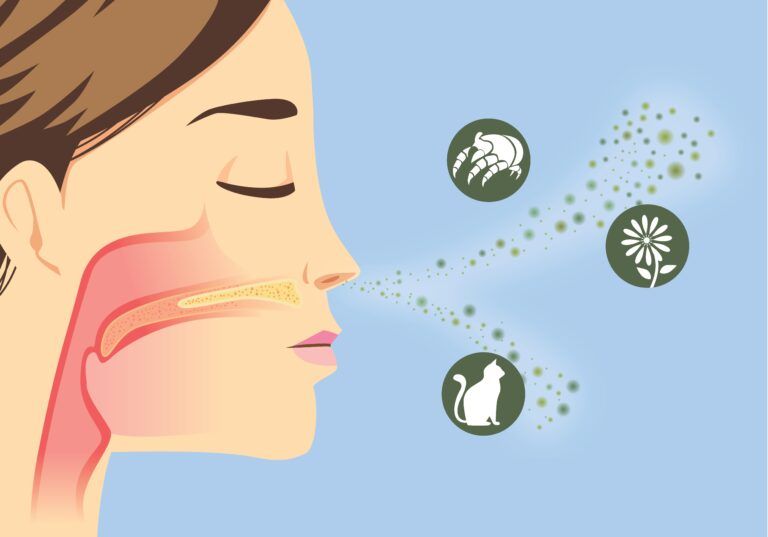For millions of Americans, springtime and the warmer months mean itchy eyes, runny noses, sneezing fits… and some serious oral health problems. Allergies affect millions of people every year, and while most people are aware of the impact allergies can have on their respiratory system and overall health, they may not realize that allergies can also have a significant impact on oral health. In this blog, we’ll explore how allergies affect oral health and provide tips for managing your oral health while managing your allergies.
What are seasonal allergies?
Seasonal allergies, also known as hay fever or allergic rhinitis, are a type of allergy that occur during certain times of the year. These allergies are usually caused by airborne particles such as pollen from trees, grasses and flowers. They can also be caused by other common allergens such as animal dander, dust mites, or mold spores.
Symptoms of seasonal allergies can include:
- Sneezing, runny nose and itchy eyes
- Coughing, wheezing and chest tightness
- Fatigue
- Headache
- Dark circles under the eyes
- Swollen glands in neck or jaw area.
Allergies and Oral Health – A Brief Overview
Suffering from seasonal allergies can have a severe impact on your oral health, much more so than most people realize. At a glance, here are some of the ways that allergies can affect your oral health:

Sinus Pressure and Tooth Pain
One of the most common ways that allergies affect oral health is through sinus pressure and tooth pain. Allergies can cause inflammation in the sinuses, which can put pressure on the roots of the upper teeth, leading to tooth pain and sensitivity. With that being said, it is always important to have your dentist evaluate a sore tooth to determine the exact cause of the discomfort.
Dry Mouth and Tooth Decay
Allergies can also cause dry mouth, either through nasal congestion that causes mouth breathing or through taking antihistamine medications. Dry mouth can increase the risk of tooth decay and gum disease. Saliva helps to wash away food particles and bacteria from the mouth, and when there is not enough saliva, these particles and bacteria can remain in the mouth, leading to dental problems.
Bad Breath
Although bad breath, or halitosis, is not as serious as other dental issues, it is another common side effect of allergies. This is because when you suffer from allergies, bacteria can build up in the mouth and lead to an unpleasant odor. Postnasal drip can also cause throat irritation and an unpleasant odor.
Tooth Grinding and Clenching
Allergies can also lead to tooth grinding and clenching. When a person is congested, they may breathe through their mouth, which can cause dry mouth and discomfort. This discomfort can lead to tooth grinding and clenching, which can cause tooth damage, headaches, and jaw pain.
Tips for Managing Allergies and Oral Health
Keeping your mouth and teeth clean is crucial for managing your oral health while managing your allergies. Fortunately, there are steps you can take to manage both your allergies and your oral health at the same time. Here are some tips:
- Stay hydrated: Keeping yourself well-hydrated can help to reduce symptoms of allergies by flushing out allergens. Additionally, drinking water also keeps your saliva production up, which can help keep your mouth healthy.
- Stimulate Saliva Production: Chewing sugarless gum or candy is another way to help stimulate saliva production. This is especially important if you are taking antihistamine medications known to cause dry mouth.
- Practice proper oral hygiene: Good oral hygiene is the foundation of good oral health, so be sure to keep up on brushing and flossing. Brushing twice a day and flossing once a day can help remove food particles and bacteria that can negatively affect your oral health.
- Rinse your mouth: In addition to brushing and flossing, it may also be helpful to use a mouthwash to help rinse away bacteria that may be causing bad breath. If you are experiencing postnasal drip, it may also be beneficial to gargle with a warm salt water rinse. This soothes irritation and decreases bacterial growth in the throat.
- Visit the dentist: It is important to visit the dentist at least twice a year for checkups and cleanings. This will help to ensure that your oral health is in good shape, even when you are suffering from allergies. Be sure to mention your allergies to your dentist so they can help you with preventative care.
In Conclusion
Seasonal allergies are a common health problem for many Americans. While they are primarily known for causing nasal congestion and other respiratory symptoms, seasonal allergies can also have a major impact on your oral health. By following the tips above, you can help to manage your allergies and keep your teeth and gums healthy.




